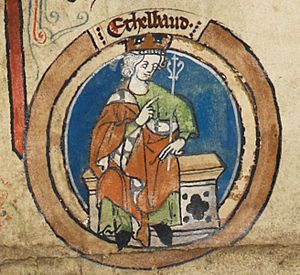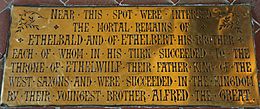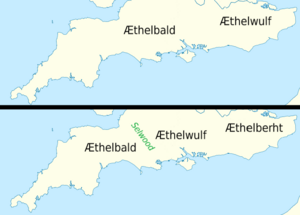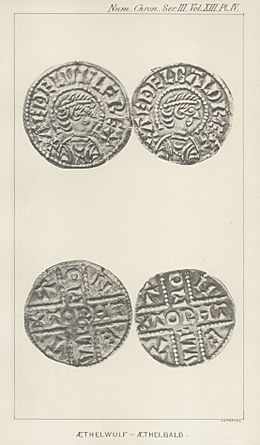Æthelbald, King of Wessex facts for kids
Quick facts for kids Æthelbald |
|
|---|---|

Æthelbald in the early 14th-century Genealogical Roll of the Kings of England
|
|
| King of Wessex | |
| Reign | 855 or 858 – 860 |
| Predecessor | Æthelwulf |
| Successor | Æthelberht |
| Died | c. July 860 |
| Burial | Sherborne, Dorset |
| Spouse | Judith of Flanders (m. 858) |
| House | Wessex |
| Father | Æthelwulf |
| Mother | Osburh? |
Æthelbald (died 860) was a king of Wessex, an old Anglo-Saxon kingdom in England. He ruled from 855 or 858 until his death in 860. Æthelbald was the second of five sons of King Æthelwulf.
In 850, his older brother Æthelstan won the first recorded sea battle in English history against the Vikings. However, Æthelstan likely died soon after. The next year, Æthelwulf and Æthelbald also defeated the Vikings at the Battle of Aclea.
In 855, King Æthelwulf went on a pilgrimage to Rome. He made Æthelbald the King of Wessex while his next oldest son, Æthelberht, became King of Kent. Kent had been taken over by Wessex about 30 years earlier.
On his way back from Rome, Æthelwulf married Judith of Flanders, the 12-year-old daughter of Charles the Bald, King of the Franks. When Æthelwulf returned to England in 856, Æthelbald did not want to give up his crown. Most historians believe Æthelbald stayed King of Wessex. Æthelberht then gave Kent back to his father. Some think Wessex was split, with Æthelbald ruling the west and his father the east.
When Æthelwulf died in 858, Æthelbald continued as King of Wessex. His brother Æthelberht became King of Kent again. Æthelbald later married his stepmother, Judith. This marriage was seen as unusual by some, but it did not seem to cause problems at the time. Æthelbald and Æthelberht seemed to get along well. When Æthelbald died in 860, Æthelberht became king of both Wessex and Kent, uniting them.
Contents
Who was King Æthelbald?
Family and Early Life
Æthelbald was the second son of King Æthelwulf. His mother was likely Osburh, who was also the mother of Alfred the Great. Since his older brother Æthelstan was a king ten years before Alfred was born in 849, some historians think Æthelbald and his older siblings might have had a different mother.
Æthelbald and his three younger brothers all became kings of Wessex one after another:
- Æthelbald (855–860)
- Æthelberht (860–865)
- Æthelred I (865–871)
- Alfred the Great (871–899)
Æthelbald is first mentioned in 840 as the king's son. He later became a dux (a leader or ealdorman). In 850, his older brother Æthelstan defeated a Danish fleet near Sandwich. This was the first recorded naval battle in English history. Æthelstan probably died soon after this.
In 851, Æthelwulf and Æthelbald defeated the Vikings at the Battle of Aclea. The Anglo-Saxon Chronicle said that this battle had the greatest number of Viking deaths ever recorded in one day. In 855, their father went on a trip to Rome. He then made Æthelbald king of Wessex and Æthelberht king of Kent.
Dividing the Kingdom
King Æthelwulf spent a year in Rome. On his way back, he stayed with Charles the Bald, King of the West Franks. He married Charles's 12-year-old daughter, Judith of Flanders. She was a great-granddaughter of Charlemagne. The bishop of Rheims officially made her a queen.
When Æthelwulf returned to England in 856, there was a plan to stop him from taking back his throne. This plan was made to keep Æthelbald as king. Bishop Asser, who wrote about Alfred the Great, called this a "terrible crime." He said that many people blamed Æthelbald's main advisors, but others blamed Æthelbald himself.
Historians have different ideas about why this happened. Some think Æthelwulf's marriage to Judith was to create an alliance against the Vikings. Her royal background also gave Æthelwulf more respect. This marriage might have worried Æthelbald because it suggested that a son of Judith could become king. He might have feared losing his power if his father returned to rule Wessex.
To avoid a civil war, Æthelwulf agreed to divide the kingdom. Most historians believe Æthelbald kept Wessex. Æthelberht gave the south-eastern kingdoms (Kent, Essex, Surrey, and Sussex) back to Æthelwulf. Some historians think Wessex itself was divided, with Æthelbald ruling the western part and Æthelwulf the eastern part. Æthelberht would have kept Kent.
Æthelbald's Time as King
His Reign and Marriage
When King Æthelwulf died in January 858, his kingdom was divided between his two oldest sons. Æthelbald continued as King of Wessex, and Æthelberht became King of Kent and the south-east.
To keep the respect that came from being connected to a powerful Frankish princess, Æthelbald married his stepmother, Judith. The Anglo-Saxon Chronicle does not mention this marriage. This might be because it focused on Alfred the Great's achievements and did not want to highlight his older brother's important connections.
Bishop Asser later criticized Æthelbald's marriage to his stepmother. He called it "against God's prohibition and Christian dignity." However, it seems the marriage did not cause much opposition at the time. Frankish records simply reported the marriage without comment. When Judith returned to her father after Æthelbald's death, she was treated "with all the honour due to a queen." She later ran away with Baldwin, Count of Flanders. Their son, Baldwin II, married Alfred's daughter, Ælfthryth.
What We Know About His Rule
We do not know much about Æthelbald's time as king. Only two of his official documents (charters) still exist. One charter from 858 shows a grant of land to the king for his lifetime. Another charter from 860 shows Æthelbald giving land to a nobleman.
Both of these documents were signed by Judith, which shows her high status. Wives of West Saxon kings in the 800s were not usually called queens and rarely signed official documents. This suggests that Æthelbald wanted his own son to become king, not his brothers. The 860 charter was also signed by King Æthelberht, which suggests they had a good relationship.

No coins are known to have been made in Æthelbald's name. The main mints (places where coins are made) in southern England were in Kent. They made coins for Æthelwulf until 858, and then for Æthelberht. There was a mint in Wessex, but it made very few coins during this time. This shows that Æthelbald was not in charge of his brother's kingdom. Some coins once thought to be Æthelbald's were later found to be fakes.
Death of King Æthelbald
Æthelbald died in 860. The Anglo-Saxon Chronicle says he ruled for five years, counting from 855 when his father left for Rome. Other sources say he ruled for two and a half years after his father's death. Since his father died in January 858, Æthelbald likely died around July 860.
He was buried at Sherborne in Dorset. He is not known to have had any children. His brother Æthelberht became king after him, uniting Wessex and Kent under one ruler. It is not clear if the division of the kingdom was meant to be permanent. However, Æthelbald's early death allowed Æthelberht to bring the kingdoms back together. Kent and the south-east then became a full part of Wessex.
How Was Æthelbald Remembered?
Bishop Asser, writing in the 890s, was the only person at the time to describe Æthelbald. Asser did not like Æthelbald because of his rebellion against his father and his unusual marriage. He called Æthelbald "wicked and greedy" and his reign "lawless."
Later historians after the Norman Conquest also followed Asser's negative views. For example, William of Malmesbury wrote that Æthelbald was "worthless and disloyal" and "defiled his father's marriage-bed" by marrying his stepmother. John of Worcester also condemned the marriage.
However, Henry of Huntingdon, another historian, had a different view. He wrote that Æthelbald and Æthelberht were "young men of superlative natural quality" who ruled their kingdoms well. He said that when Æthelbald died early, "All England lamented King Æthelbald's youth and there was great sorrow over him."
More recent historians have been more careful in their judgments. Frank Stenton did not give an opinion on Æthelbald. Sean Miller noted that very little is known about Æthelbald's reign after his marriage, but he seemed to have a good relationship with his brother Æthelberht.
See also
 In Spanish: Ethelbaldo de Wessex para niños
In Spanish: Ethelbaldo de Wessex para niños
 | Emma Amos |
 | Edward Mitchell Bannister |
 | Larry D. Alexander |
 | Ernie Barnes |



